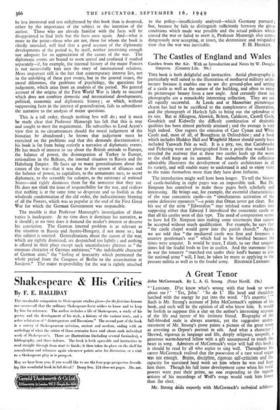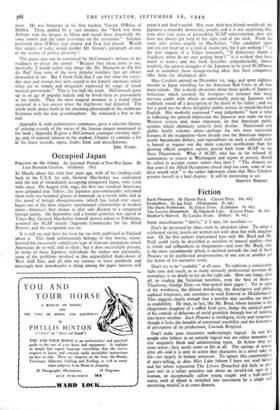A Great Tenor
John McCormack. By L. A. G. Strong. (Peter Nevill. 15s.)
" LEONARD. D'ye know what's wrong with that book ye wrote about me ? " Yes, John.' So do I' His head and shoulder, lurched with the energy he put into the word. ' It's anaemic ! Such is Mr. Strong's account of John McCormack's opinion of hi- book, and such will be the opinion of all who knew him. It would be foolish to suppose this a slur on the author's interesting account of the life and -career of his intimate friend. Biography of th,:. full-blooded male is always anaemic, yet the suggestive under- statement of Mr. Strong's prose paints a picture of the great two: as arresting as Orpen's portrait in oils. And what a character Shrewd, vigorous in language and life, deeply religious, unspoilt, generous warm-hearted fellow with a gift unsurpassed to touch the heart in song. Admirers of McCormack's voice will hail this book ; it should be read by all who aspire to sing well. Throughout ht, career McCormack realised that the possession of a rare vocal organ was not enough. Brains, discipline, rigorous self-criticism and capacity for sustained hard work set him where he was and kepi him there. Though his full inner development came when his roca' powers were past their prime, no one responding to the superb artistry of his recordings of Wolf's songs would rank him lower than the elect.
Mr. Strong deals expertly with McCormack's technical adieu'--
ment. He was fortunate in his first teacher, Vincent O'Brien of Dublin. Then, guided by a sure instinct, the " Irish boy from Athlone took his brogue to Milan and found there practically the same vowels and the same insistence on the consonant." Sabatini perfected what O'Brien had shaped and God had placed. Would that singers of today would ponder Mr. Strong's paragraph on one of the secrets of perfect phrasing !
The purist may not be convinced by McCormack's defence of his readiness to please the crowd. " Because they mean more to me, musically, I would rather sing songs like Die Mainacht or Du bist die Ruh' than some of the more popular numbers that are always demanded of me. But I thank God that I can feel what thc every- day man and woman feel with regard to the homely emotions which often are so simply and eloquently expressed by songs of lesser musical pretensions." This is but half the truth. McCormack grew up in an age of popular ballads and he loved them as passionately as his family. Thus the most magical moment in a recital often occurred in a late encore when the highbrows had departed. The whole truth shines forth in the charming photograph of the exuberant Irishman with his tiny granddaughter. He remained a boy to the end.
Appendix A, with authoritative comments, gives a selective history of existing records of the voices of the famous singers mentioned in the book ; Appendix B gives a McCormack catalogue covering 1907- 39, and, of especial interest to the student, Chapter 12 contains a list of his finest records, opera, lieder, Irish and miscellaneous.
ERIC FENBY.



































 Previous page
Previous page